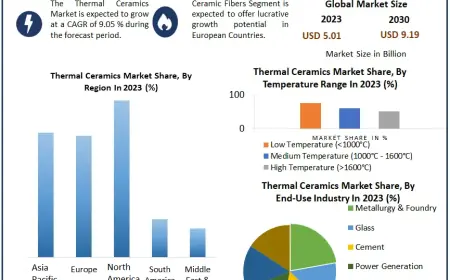Heat Shields Market: A Protective Investment or Risky Bet?
The Infinium Global Research analyzes the Automotive Heat Shield Market over the period of 2024 to 2032.
The Infinium Global Research analyzes the Automotive Heat Shield Market over the period of 2024 to 2032. This report also provides detailed qualitative and quantitative analyses of the market dynamics, market size and future trends in global automotive heat shield market. It will help a lot of decision makers to develop strategies and find new opportunities in the global markets of automotive heat shield. The report covers market changing aspects including drivers, restraints, opportunities, and trends expected to encouragement the expansion of the automotive heat shield market during the period.
Market Dynamics:
Drivers:
- Increasing Vehicle Production: The rising production of vehicles globally directly drives the demand for heat shields, essential for protecting various automotive components.
- Stringent Emission and Safety Regulations: Regulatory pressures to reduce vehicle emissions and improve safety standards boost the adoption of advanced heat shields.
- Technological Advancements: Innovations in materials and heat shield designs enhance performance and durability, driving market growth.
Challenges:
- High Material Costs: Advanced materials used in heat shields, such as composites and ceramics, can be expensive, impacting overall costs.
- Complex Manufacturing Processes: The production of high-performance heat shields requires sophisticated manufacturing techniques, posing a challenge to market growth.
Opportunities:
- Electric and Hybrid Vehicles: The growing market for electric and hybrid vehicles, which require effective thermal management, presents significant growth opportunities for heat shields.
- Aftermarket Demand: Increasing vehicle longevity and the need for replacement parts drive demand in the aftermarket segment.
Regional Analysis:
North America:
- Market Growth: Driven by high adoption of advanced automotive technologies and stringent emission standards.
- Key Trends: Increasing production of electric and hybrid vehicles boosts demand for specialized heat shields.
Europe:
- Market Growth: Strong automotive industry and stringent environmental regulations drive the market.
- Key Trends: Focus on reducing emissions and improving fuel efficiency spurs innovation in heat shield technology.
Asia-Pacific:
- Market Growth: Rapid industrialization, increasing vehicle production, and rising disposable incomes drive market growth.
- Key Trends: Growing automotive sector in China, India, and Japan boosts demand for heat shields.
Rest of the World:
- Market Growth: Emerging markets in Latin America, the Middle East, and Africa contribute to market expansion.
- Key Trends: Economic growth and improving living standards drive the automotive industry, increasing demand for heat shields.
SAMPLE PAGES OF REPORT: https://www.infiniumglobalresearch.com/reports/sample-request/996
Market Segmentation:
By Material:
- Metallic: Widely used for their durability and heat resistance.
- Non-metallic: Increasingly popular due to their lightweight and advanced thermal insulation properties.
By Vehicle Type:
- Passenger Vehicles: Higher adoption rate due to the emphasis on safety and performance.
- Commercial Vehicles: Growing demand driven by the need for effective heat management in heavy-duty applications.
By Sales Channel:
- OEMs (Original Equipment Manufacturers): Dominant sales channel due to the integration of heat shields in new vehicles.
- Aftermarket: Growing segment driven by vehicle customization trends and replacement needs.
Competitive Landscape:
Market Share and Control:
- Large Players: Companies like Tenneco, ElringKlinger, and Lydall hold significant market shares due to their extensive product portfolios and strong distribution networks.
- Pricing Control: Large players often influence market prices through economies of scale and advanced technology offerings.
- Small and Mid-Size Companies: These companies challenge larger players domestically by offering cost-effective solutions and catering to niche markets.
Key Players:
- Tenneco Inc.: Known for its innovative heat shield solutions and strong market presence.
- ElringKlinger AG: Offers a wide range of automotive heat shields, focusing on performance and durability.
- Lydall Inc.: A leader in thermal and acoustical solutions, providing advanced heat shields.
- Dana Incorporated: Specializes in high-performance heat management solutions for the automotive industry.
- Morgan Advanced Materials: Provides advanced materials and heat shield solutions, emphasizing innovation and quality.
REPORT OVERVIEW: https://www.infiniumglobalresearch.com/reports/global-automotive-heat-shield-market
Future Outlook:
Product Development and Marketing:
- New Product Development: Continuous innovation and the development of advanced heat shields tailored for electric and hybrid vehicles help companies stay competitive and meet evolving market demands.
- Sustainable Products: The increasing focus on sustainability drives the development of heat shields made from recyclable materials and those that enhance fuel efficiency.
Conclusion:
The automotive heat shield market is poised for growth, driven by rising vehicle production, stringent emission norms, and technological advancements. Challenges such as high material costs and complex manufacturing processes exist, but opportunities in the electric and hybrid vehicle segment and the aftermarket offer promising prospects. Major players dominate the market, but smaller companies continue to innovate and compete. With a focus on new product development and sustainability, the market is set to evolve, meeting the demands of a dynamic automotive industry.
What's Your Reaction?
 Like
0
Like
0
 Dislike
0
Dislike
0
 Love
0
Love
0
 Funny
0
Funny
0
 Angry
0
Angry
0
 Sad
0
Sad
0
 Wow
0
Wow
0

















































